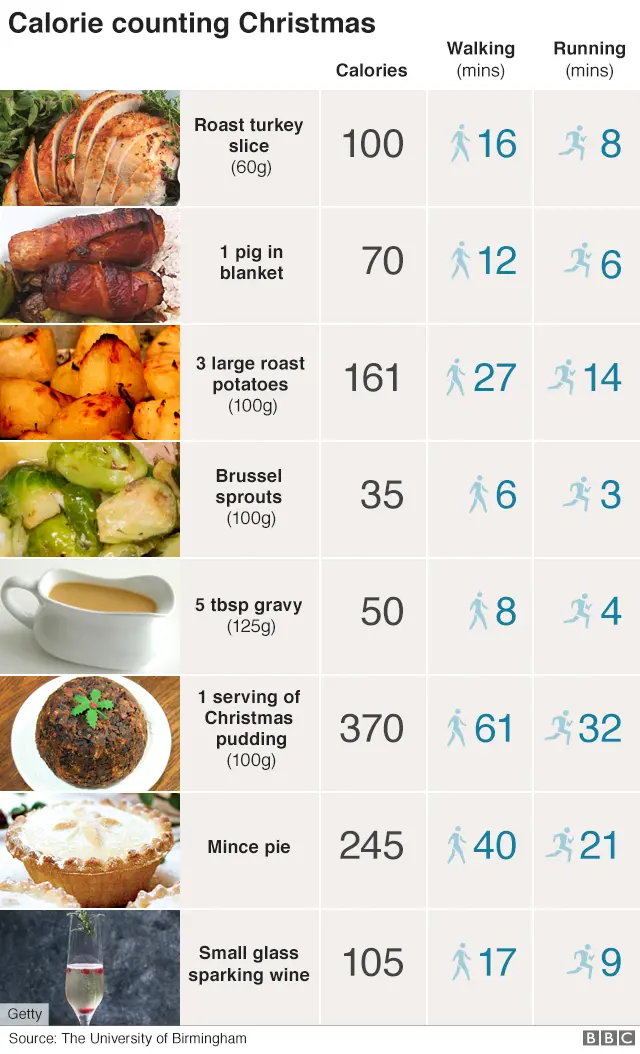'Weigh-ins help prevent piling on pounds at Christmas'
 andriano_cz
andriano_czRegular weigh-ins at home, plus simple weight-loss tips, could prevent people from piling on the pounds at Christmas, according to a new study.
The Universities of Birmingham and Loughborough divided 272 volunteers into two groups. The "intervention" group weighed themselves regularly.
They were also given information on how much exercise was needed to burn calories in Christmas food.
They ended up weighing 1lb (0.49kg) less than the "comparison" group.
The comparison group didn't track their weight - they were just given a healthy lifestyle leaflet, which did not include dietary advice.



The researchers say the Winter Weight Watch Study, published today in the BMJ, is the first to look at preventing seasonal weight gain.
Lead author Frances Mason, of the University of Birmingham's Institute of Applied Health Research, said avoiding weight gain during the festive period could help in the long-term fight against obesity.
"People gain a kilo of weight on average annually. Often this weight gain happens at Christmas, and is never fully lost. This could possibly be a factor driving the obesity epidemic."
How to avoid festive weight gain
The trial was carried out in 2016 and 2017 over a period of six to eight weeks in November and December. Follow-up measurements were then taken in January and February of the following year.
The intervention group were asked to record their weight on a record card and given 10 tips for weight management.
They were also given a list of how much physical activity would be needed to burn off the calories found in popular Christmas food and drinks.
That mince pie might not be as appealing when you factor in the 21 minutes of running needed to burn off the 245 calories found in an average pie.
The groups were also given these tips for weight management:
- 1. Keep to your meal routine - try to eat at roughly the same time each day
- 2. Go reduced fat - choose reduced-fat foods (eg: dairy, spreads, salad dressings) where you can
- 3. Walk off the weight - walk 10,000 steps each day
- 4. Pack a healthy snack - choose fresh fruit or low-calorie yoghurts
- 5. Learn the labels - be careful about food claims. Check the fat and sugar on food labels
- 6. Caution with your portions - do not heap food on your plate (except vegetables)
- 7. Up on your feet - stand up for 10 minutes out of every hour
- 8. Think about your drinks - choose water or sugar-free squash. Limit fruit juice. Alcohol is high in calories so limit to one a day for women and two for men
- 9. Focus on your food. Slow down. Do not eat on the go or while watching TV
- 10. Do not forget your five-a-day - eat at least five portions of fruit and veg a day.
Source: International Journal of Obesity
'A small amount of restraint'
Researchers were not able to identify which of the 10 potential interventions led to the weight loss, although 85% of those who did lose weight stood on the scales twice a week.
But they did conclude that the intervention group were more able to retrain their eating and drinking. They were also marginally less likely to drink alcohol.
But isn't Christmas a time when we are supposed to be able to overindulge?
 seb_ra
seb_raFrances Mason said they had no problem recruiting volunteers, saying: "This suggests people were willing to exercise just a small amount of restraint, while still enjoying the Christmas period.
"It's small changes like say instead of consuming five pigs-in-blankets, consume one or two. Or make sure you get out of the house for a walk. Research shows people underestimate calories, and overestimate their calorie expenditure.
"This is why accurate self-monitoring is an effective strategy for weight management."
This might also explain the explosion in the popularity of mobile fitness and diet tracker apps. The global mobile fitness app market grew from $1.8bn in 2016 to $2.2bn, says research firm Statista.
Researchers from global insurer Vitality also recently showed that offering customers an smartwatch, at minimal cost if they stuck to a fitness regime, also resulted in more regular exercise.
